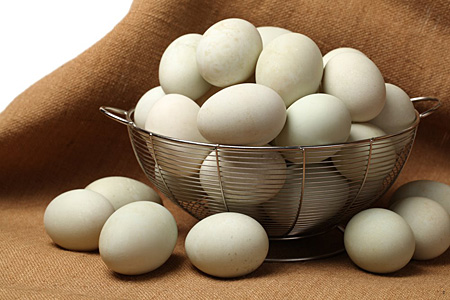
These days everyone seems to be talking about the benefits of duck eggs, which can be pretty pricey at the local farmers’ market. Luckily, when you keep your own ducks, you have ready access to freshly laid eggs. How well you like them depends to a great extent on how you handle your duck eggs for eating.
Keeping the Eggs Clean
The shell of a recently laid egg is coated with a moist but fast-drying fluid called the bloom or cuticle. The purpose of bloom is to keep in moisture and keep out bacteria. If you wash the egg, you wash off its protective bloom.
So it’s important to ensure that your duck eggs for eating stay clean until you gather them. Keeping the eggs clean involves clean housing, clean nesting areas, and uncrowded living space. Collecting the eggs soon after they are laid can also make a big difference.
Most ducks lay in the early morning. If you keep your ducks in their tidy coop until they finish laying for the day, then collect the eggs once you let them out, you’re more likely to have clean eggs. You’ll also have an easier time finding the eggs.
You might begin by letting the ducks out at 8:00 a.m. If some of your ducks then lay outside the coop, keep them in a bit later each day. In that way you can determine the time when all your ducks have finish laying for the morning.
If you find an egg that’s lightly soiled, brushing it clean is okay. When an egg is mildly soiled, you can wash it in water that’s a bit warmer than the egg. But use the washed egg right away, because it won’t keep as well as an unwashed egg. Discard an extremely soiled egg.
Storing Duck Eggs
Compared to chicken eggs, stored duck eggs stay fresh longer. The white of a duck egg doesn’t thin as readily, the yolk membrane doesn’t weaken as much, and the yolk doesn’t deteriorate as rapidly. So when you crack a duck egg into a frying pan, it won’t spread as much as a chicken egg of the same age.
Stored eggs rarely go “bad,” as in rot. But out of concern you could candle duck eggs for eating the same way you would candle them for incubation. A good egg has a clearly visible yolk surrounded by translucent albumen.
You can really tell an egg is “good” when you crack it open. You already know what a fresh egg looks and smells like, so you will know if one doesn’t seem right.
Fresh, clean duck eggs stored in a carton in a properly cold refrigerator will keep well for about four months. That means when you have extra eggs you can store them for later use .
Cooking with Duck Eggs
Do duck eggs taste exactly the same as chicken eggs? Some people can’t tell the difference. Others say that duck eggs have either a stronger flavor or a less strong flavor compared to chicken eggs. So how duck eggs taste to you is somewhat subjective, but also depends on what the ducks have been eating.
Use duck eggs for eating in the same ways you would use chicken eggs, but with a few minor differences. For instance, the firmer albumen of a duck egg takes a bit longer to whip. Also, if you overcook a fried duck egg, it may become somewhat chewy.
On the plus side, duck eggs have more fat and protein compared to chicken eggs. So when they’re used for baking, the result is lighter and more flavorful pastries.
Measuring Eggs
Most recipes for baked goods call for large chicken eggs. To find out how your duck eggs compare, crack a few, mix them together, and weigh them on a kitchen scale. Then divide the total weight by the total number of eggs. If the average weight is close to 50 grams, you can use one duck egg in place of each chicken egg.
If your duck eggs significantly vary from 50 grams, you will need to convert their size either by weight or by volume. Find details here: Egg Size Conversions for Recipes.
For more information on ducks and duck eggs:
Furnishing Nests for Laying Ducks
Ducks for Eggs — How to Keep Your Ducks Laying Well
How the Eggs of Chickens, Turkeys, Ducks, and Geese Compare
And that’s today’s news from the Cackle Coop.
Gail Damerow is the author of An Absolute Beginner’s Guide to Raising Backyard Ducks : Breeds, Feeding, Housing and Care, Eggs and Meat.

